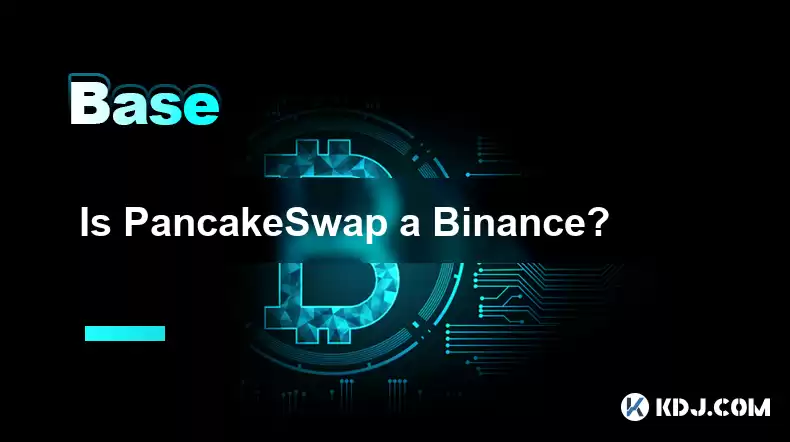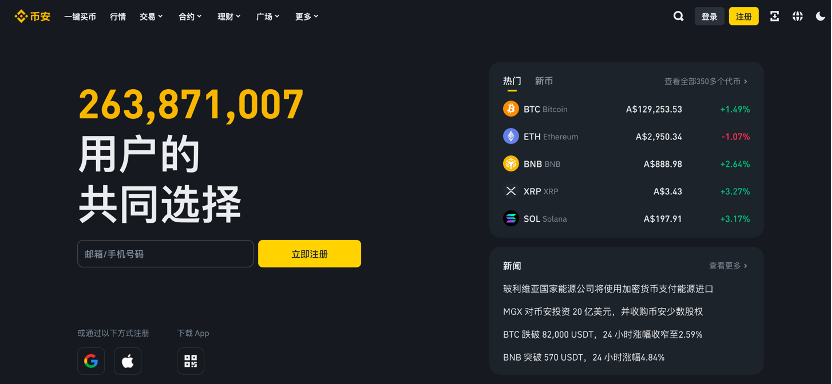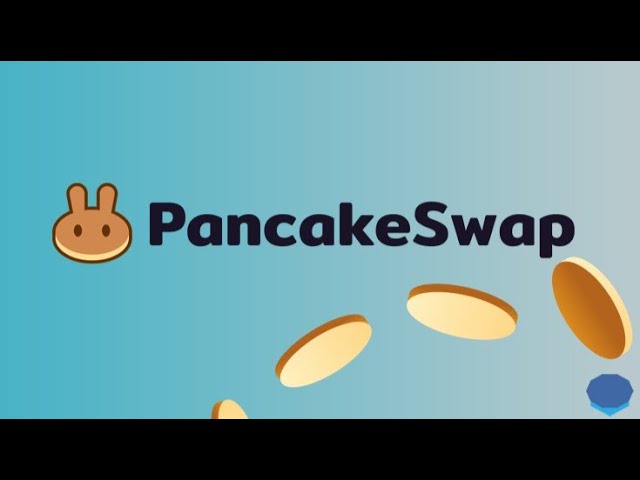-
 bitcoin
bitcoin $87959.907984 USD
1.34% -
 ethereum
ethereum $2920.497338 USD
3.04% -
 tether
tether $0.999775 USD
0.00% -
 xrp
xrp $2.237324 USD
8.12% -
 bnb
bnb $860.243768 USD
0.90% -
 solana
solana $138.089498 USD
5.43% -
 usd-coin
usd-coin $0.999807 USD
0.01% -
 tron
tron $0.272801 USD
-1.53% -
 dogecoin
dogecoin $0.150904 USD
2.96% -
 cardano
cardano $0.421635 USD
1.97% -
 hyperliquid
hyperliquid $32.152445 USD
2.23% -
 bitcoin-cash
bitcoin-cash $533.301069 USD
-1.94% -
 chainlink
chainlink $12.953417 USD
2.68% -
 unus-sed-leo
unus-sed-leo $9.535951 USD
0.73% -
 zcash
zcash $521.483386 USD
-2.87%
Is PancakeSwap a Binance?
PancakeSwap, a decentralized exchange (DEX) on Binance Smart Chain, differs significantly from Binance, a centralized exchange, in its operational model, asset offerings, and regulatory oversight.
Mar 21, 2025 at 04:12 pm

PancakeSwap : It is a decentralized exchange (DEX) based on Binance Smart Chain. This means that it relies on blockchain technology and uses smart contracts to facilitate transactions without the participation of traditional centralized institutions. Users can directly interact with smart contracts, control funds independently, and have relatively high privacy in transactions.
Binance : As a world-renowned centralized cryptocurrency exchange, Binance is at the top of the industry. On this platform, Binance acts as a trading intermediary, responsible for matching orders between buyers and sellers. The platform has a strict currency listing review process, and users need to perform compliance operations such as identity verification, and the transaction experience is relatively closer to the traditional financial transaction model.
PancakeSwap : Uses automatic market maker (AMM) mode. Simply put, it relies on liquidity pools to provide the liquidity required for trading. Users can inject two cryptocurrencies into the liquidity pool to form a trading pair. For example, when you inject a certain amount of CAKE (native tokens for PancakeSwap) and BNB (native tokens for Binance Smart Chain), it provides liquidity for the CAKE-BNB trading pair. When trading, the price is determined based on the ratio of the two assets in the liquidity pool and the specific algorithm, rather than on the order book like traditional exchanges.
Binance : Use order book mode. The platform records orders at different prices between buyers and sellers. When the price of the buyer and seller matches, the transaction can be completed. For example, someone wants to sell Bitcoin for $5,000, and someone is willing to buy it at this price, and Binance will match the deal. In this mode, the transaction price is clear and intuitive, and the transaction execution speed is usually faster.

PancakeSwap : Mainly trades tokens based on Binance Smart Chain. Its native token CAKE has many uses, such as participating in liquidity mining to obtain income, and using it to govern voting to determine the development direction of the platform. In addition, there are a large number of emerging project tokens on the platform with innovative concepts. Most of these projects are issued by startup teams in the blockchain field, with high potential benefits, but at the same time, the risks are relatively large.
Binance : The types of assets supported are extremely rich, covering the world's mainstream cryptocurrencies, such as Bitcoin (BTC), Ethereum (ETH), etc., as well as many niche but potential crypto assets. Binance also provides fiat currency and cryptocurrency trading pairs to facilitate users to purchase cryptocurrencies using fiat currency, which is not available in many decentralized exchanges.
PancakeSwap : For users with certain blockchain knowledge, the operation is relatively simple. However, due to its decentralized nature, users need to manage important information such as private keys by themselves. Once the private key is lost, the assets will not be retrieved. Moreover, during the transaction process, users may encounter problems such as network congestion, resulting in transaction delays and large fluctuations in handling fees. They need to have a certain understanding of concepts such as Gas fees (blockchain transaction fees) in order to better conduct transactions.

Binance : The user interface is friendly, the operation process is relatively standardized, making it easy for novices to get started. The platform provides detailed transaction guides and customer service support. When encountering problems, users can contact customer service through various channels to obtain help. At the same time, Binance's trading system has been optimized for many years, with fast trading speed and high stability, which can meet the trading needs of different users.
PancakeSwap : The decentralized feature makes its security dependent to a certain extent on the security of smart contracts. Although smart contracts have been audited, there is still a risk of being hacked, such as smart contract code vulnerabilities that may lead to theft of user assets. Since it is not directly regulated by traditional financial regulatory agencies, it will be relatively difficult for users to protect their rights once problems arise. However, its transaction records are open and transparent, and all transactions are recorded on the blockchain, which are highly traceable.
Binance : As a centralized exchange, it is strictly regulated by financial regulatory agencies in many countries and regions. The platform adopts a variety of security measures, such as multi-signature, cold wallet storage of most assets, etc., to ensure the security of user assets. At the same time, the intervention of supervision has enabled the platform to perform well in compliance, and the rights and interests of users in the transaction process are protected by law to a certain extent. But the centralized architecture has also made it the target of hacker attacks, and hacker attacks have occurred in history, resulting in loss of user assets.
Disclaimer:info@kdj.com
The information provided is not trading advice. kdj.com does not assume any responsibility for any investments made based on the information provided in this article. Cryptocurrencies are highly volatile and it is highly recommended that you invest with caution after thorough research!
If you believe that the content used on this website infringes your copyright, please contact us immediately (info@kdj.com) and we will delete it promptly.
- Trump Dives Deeper into Crypto: Launch of New Coin Fuels Market Buzz and Regulatory Scrutiny
- 2026-02-06 15:40:02
- Spur Protocol Airdrop Claim Details Emerge Amidst Market Volatility
- 2026-02-06 15:50:01
- Naira's Dynamic Dance: Navigating Depreciation and Resilience in Nigeria's Official Exchange Market
- 2026-02-06 15:35:02
- Strategy's Bitcoin Bet Sours: Billions in Loss as Crypto Faces Reckoning
- 2026-02-06 15:50:01
- NYC Reacts: Bitcoin Price Sees Sharp BTC Fall, Fueling Market Uncertainty
- 2026-02-06 13:20:01
- CME Coin Ignites Wall Street's Tokenized Finance Revolution: A New Era Dawns
- 2026-02-06 13:20:01
Related knowledge

What is the future of cryptocurrency and blockchain technology?
Jan 11,2026 at 09:19pm
Decentralized Finance Evolution1. DeFi protocols have expanded beyond simple lending and borrowing to include structured products, insurance mechanism...

Who is Satoshi Nakamoto? (The Creator of Bitcoin)
Jan 12,2026 at 07:00am
Origins of the Pseudonym1. Satoshi Nakamoto is the name used by the individual or group who developed Bitcoin, authored its original white paper, and ...

What is a crypto airdrop and how to get one?
Jan 22,2026 at 02:39pm
Understanding Crypto Airdrops1. A crypto airdrop is a distribution of free tokens or coins to multiple wallet addresses, typically initiated by blockc...

What is impermanent loss in DeFi and how to avoid it?
Jan 13,2026 at 11:59am
Understanding Impermanent Loss1. Impermanent loss occurs when the value of tokens deposited into an automated market maker (AMM) liquidity pool diverg...

How to bridge crypto assets between different blockchains?
Jan 14,2026 at 06:19pm
Cross-Chain Bridge Mechanisms1. Atomic swaps enable direct peer-to-peer exchange of assets across two blockchains without intermediaries, relying on h...

What is a whitepaper and how to read one?
Jan 12,2026 at 07:19am
Understanding the Whitepaper Structure1. A whitepaper in the cryptocurrency space functions as a foundational technical and conceptual document outlin...

What is the future of cryptocurrency and blockchain technology?
Jan 11,2026 at 09:19pm
Decentralized Finance Evolution1. DeFi protocols have expanded beyond simple lending and borrowing to include structured products, insurance mechanism...

Who is Satoshi Nakamoto? (The Creator of Bitcoin)
Jan 12,2026 at 07:00am
Origins of the Pseudonym1. Satoshi Nakamoto is the name used by the individual or group who developed Bitcoin, authored its original white paper, and ...

What is a crypto airdrop and how to get one?
Jan 22,2026 at 02:39pm
Understanding Crypto Airdrops1. A crypto airdrop is a distribution of free tokens or coins to multiple wallet addresses, typically initiated by blockc...

What is impermanent loss in DeFi and how to avoid it?
Jan 13,2026 at 11:59am
Understanding Impermanent Loss1. Impermanent loss occurs when the value of tokens deposited into an automated market maker (AMM) liquidity pool diverg...

How to bridge crypto assets between different blockchains?
Jan 14,2026 at 06:19pm
Cross-Chain Bridge Mechanisms1. Atomic swaps enable direct peer-to-peer exchange of assets across two blockchains without intermediaries, relying on h...

What is a whitepaper and how to read one?
Jan 12,2026 at 07:19am
Understanding the Whitepaper Structure1. A whitepaper in the cryptocurrency space functions as a foundational technical and conceptual document outlin...
See all articles










































































